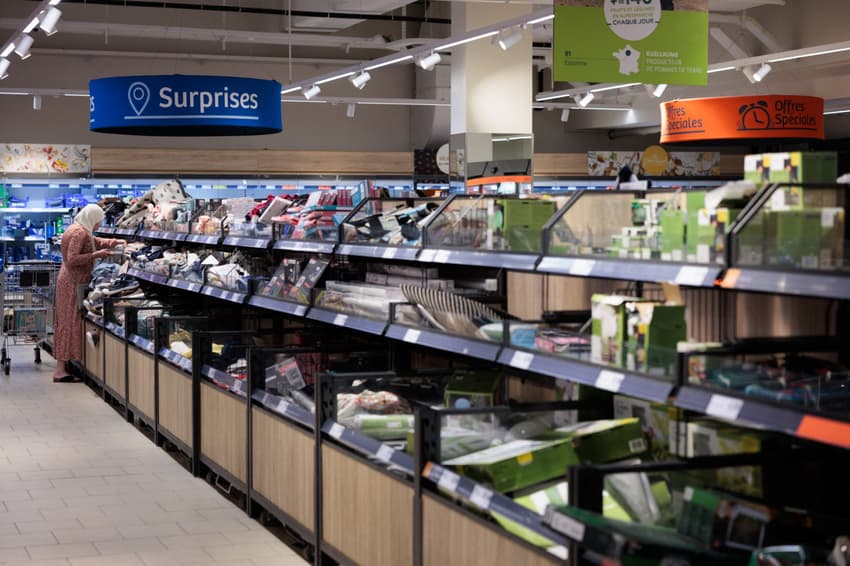French shoppers switch brands as food prices remain high

Inflation in the eurozone's second-largest economy France accelerated in December, official data showed on Thursday, with food prices a persistent sore point for consumers.
Prices grew 3.7 percent year-on-year last month, statistics authority Insee said in preliminary figures, up from the 3.5 percent pace in November.
There had been "acceleration... in the price of energy and services," Insee said, although price growth slowed for manufactured goods and the closely-watched food items in the consumer basket.
With food inflation still running at 7.1 percent last month, many shoppers have been switching to lower-cost alternatives or scouring supermarkets for special offers.
Meanwhile, supermarket chain Carrefour has stopped selling Pepsico brands, which include Pepsi, Lipton, 7 Up, Lay's, Doritos, Bénénuts and Quaker, in a row over pricing. From Thursday, January 4th, shoppers at the stores will see notices that read: "We no longer sell this brand due to unacceptable price increases. Please apologize for the inconvenience caused".
In response, Paris has brought forward annual talks between food producers and retailers, hoping lower costs for food inputs can be passed through more swiftly to the public.
"We're going to be looking for areas to bring prices down, we're going to kick inflation in the teeth," Michel-Edouard Leclerc, head of the E.Leclerc supermarket chain, told broadcaster France 2 on Tuesday.
Measured using the Harmonised Index of Consumer Prices, the preferred yardstick of the European Central Bank, French inflation also rose from 3.9 percent year-on-year in November to 4.1 percent last month.
In line with other major central banks, the Frankfurt-based institution has increased its benchmark deposit rate to a record high of four percent in a bid to tame price growth in the 20-nation eurozone.
Meanwhile, the French government has submitted a draft decree to Brussels that would require supermarkets to clarify how much extra people are paying for products that have been reduced in size while the price remains the same - a concept known as 'shrinkflation'.
The Ministry of the Economy is working on a text, in order to "respond to consumers' demand to be better informed in the event of 'shrinkflation' on certain products", the office of the Minister responsible in particular for Commerce, Olivia Grégoire said this week.
Under the planned decree, supermarkets would be required to display a statement explaining how the change in product size affects the unit price "directly on the packaging or on a label attached to or placed near this product, in a visible, legible manner".
In October, Minister of the Economy, Bruno Le Maire, said that he wanted a "provision" which requires "[industrial food producers] to make reductions in content very visible".
“This has always existed, but this practice is increasing. It is unacceptable,” he said at the time.
Comments
See Also
Prices grew 3.7 percent year-on-year last month, statistics authority Insee said in preliminary figures, up from the 3.5 percent pace in November.
There had been "acceleration... in the price of energy and services," Insee said, although price growth slowed for manufactured goods and the closely-watched food items in the consumer basket.
With food inflation still running at 7.1 percent last month, many shoppers have been switching to lower-cost alternatives or scouring supermarkets for special offers.
Meanwhile, supermarket chain Carrefour has stopped selling Pepsico brands, which include Pepsi, Lipton, 7 Up, Lay's, Doritos, Bénénuts and Quaker, in a row over pricing. From Thursday, January 4th, shoppers at the stores will see notices that read: "We no longer sell this brand due to unacceptable price increases. Please apologize for the inconvenience caused".
In response, Paris has brought forward annual talks between food producers and retailers, hoping lower costs for food inputs can be passed through more swiftly to the public.
"We're going to be looking for areas to bring prices down, we're going to kick inflation in the teeth," Michel-Edouard Leclerc, head of the E.Leclerc supermarket chain, told broadcaster France 2 on Tuesday.
Measured using the Harmonised Index of Consumer Prices, the preferred yardstick of the European Central Bank, French inflation also rose from 3.9 percent year-on-year in November to 4.1 percent last month.
In line with other major central banks, the Frankfurt-based institution has increased its benchmark deposit rate to a record high of four percent in a bid to tame price growth in the 20-nation eurozone.
Meanwhile, the French government has submitted a draft decree to Brussels that would require supermarkets to clarify how much extra people are paying for products that have been reduced in size while the price remains the same - a concept known as 'shrinkflation'.
The Ministry of the Economy is working on a text, in order to "respond to consumers' demand to be better informed in the event of 'shrinkflation' on certain products", the office of the Minister responsible in particular for Commerce, Olivia Grégoire said this week.
Under the planned decree, supermarkets would be required to display a statement explaining how the change in product size affects the unit price "directly on the packaging or on a label attached to or placed near this product, in a visible, legible manner".
In October, Minister of the Economy, Bruno Le Maire, said that he wanted a "provision" which requires "[industrial food producers] to make reductions in content very visible".
“This has always existed, but this practice is increasing. It is unacceptable,” he said at the time.
Join the conversation in our comments section below. Share your own views and experience and if you have a question or suggestion for our journalists then email us at [email protected].
Please keep comments civil, constructive and on topic – and make sure to read our terms of use before getting involved.
Please log in here to leave a comment.